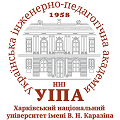The Ukrainian Engineering Pedagogics Academy joined the scientific and practical project «Ecological communal management of energy consumption» (Nakopa-E-UKR-3-19) within the framework of municipal energy management in the city of Vyshhorod, Kyiv region. The purpose of the project, which is being carried out by the communes of the Ukrainian city of Vyshhorod and the German city of Eichenau with additional funding from Engagement Global gGmbH, is to prove, using the example of the modernization of municipally owned multi-story buildings in the city of Vyshhorod, the possibility of significantly reducing energy consumption in the Ukrainian climate.
To involve UEPA in the project, a tripartite agreement was signed between the Vyshgorod City Council represented by Mayor Oleksiy Momot, the Ukrainian Engineering Pedagogics Academy and the Koberlein GmbH Engineering Bureau, which provides technical control of the project implementation from the German side.
During the first meeting, which took place from January 31 to February 2, students of higher education of the Department of Physics, Electrical Engineering and Power Engineering of UEPA, Serhii Voytenko and Zlata Oberemok, together with the teacher of this department, Yuliya Oliynyk, and the vice-rector for scientific work, Oleksandr Kupriyanov, studied the current state of the project and conducted the study of heat consumption after partial modernization of the house. A seminar was held for those interested in energy modernization of buildings. From the German side, the director of the engineering bureau, Mr. Jürgen Koberlein-Kerler, took part in the event, from the Ukrainian side, the deputy mayor of Vyshhorod, Vitaly Sardak organized the meeting.
During the next events planned for April and June, studies and calculations of the effectiveness of the energy-saving measures being carried out will continue.
The results of the project will make it possible to prove the possibility of significantly reducing the energy consumption of buildings, as a result of which reduction of CO2 emissions is achieved, to popularize energy consumption in the region, as well as to provide practical training on energy consumption for students of the academy.




